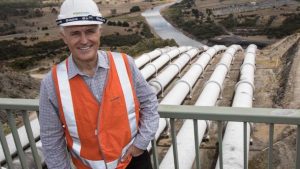The newly sworn in Queensland Labor government has named Steven Miles – the “local dad” ALP candidate for Mount Coot-Tha – as the state’s first Minister for the Great Barrier Reef.

The new role in the Queensland cabinet marks a distinct departure from the previous Campbell Newman-led Coalition government, whose singular focus on developing the state’s coal resource effectively wiped climate, the environment and clean energy off the policy map – and quite probably cost Newman the election.
And in light of the Abbott government’s failure to appoint either a climate change-dedicated minister, or a minister for science, the Queensland appointment offers a refreshing departure from federal politics, too.
“Having a Minister for the Reef is an important signal that saving our national icon is a priority for this new administration,” said WWF-Australia CEO Dermot O’Gorman in response to the news.
Also named in the new cabinet is newly-elected Mark Bailey, a former school teacher who will become minister for energy, as well as for roads and ports, thrusting him in the middle of the debate about the electricity markets, coal port expansions, and coal developments.
According to the WWF, Minister Miles will be responsible for delivering ALP environmental commitments including: a ban on dumping dredge spoil in the Great Barrier Reef World Heritage Area; an 80 per cent reduction in pollution run-off into the Reef by 2025; and the reinstatement of key legal safeguards.
Other commitments include providing an additional $100 million over five years towards water quality initiatives, scientific research and better environmental practices in the primary production and fishing industries.
“It is a matter of urgency that these commitments are included in Reef 2050 – the long-term plan to save the Reef that must be submitted to UNESCO in the next few weeks,” the WWF’s O’Gorman said.
At its annual meeting in June, the World Heritage Committee will consider whether to declare the Great Barrier Reef “World Heritage in danger.’
Indeed, Australia – and Queensland – has come under mounting global pressure to take better care of the world’s largest coral reef system, whose biggest threat, even beating global warming, was recently named as coal.
“Acidification (caused by global warming) is not the elephant in the room yet, it’s the elephant on the bus … due to get here any time now,” said University of Sydney professor Iain McCalman on The Conversation last October.
“Coal lies at the heart of current threats to the Great Barrier Reef, and symbolizes an economic mindset that reef lovers everywhere are up against.
“Our government has decided that Australia’s economic future lies in selling cheap coal to China and India,” McCalman said.
“Quite apart from discouraging investment in renewable energy by backing fossil fuels, this decision has fraught implications for the health of the Reef and its waters,” he added.
“To call this policy short-sighted is an understatement. It sacrifices one of the wonders of the world and a substantial economic asset for Australian tourism; and this at a time when even China is trying to wean itself from using polluting coal.”







